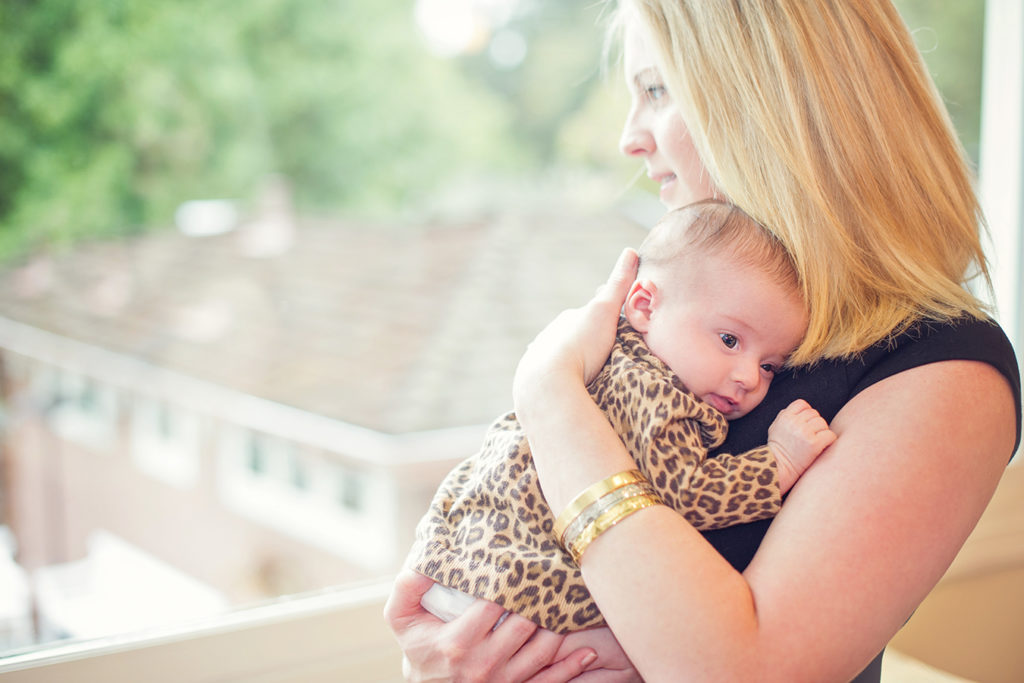
Even after all she had been through — the helicopters circling her house, the snipers on the roof and the car ride to jail — Lisa Abramson still wanted to have a second child.
That’s because right after her daughter was born in 2014 — before all that trouble began — everything felt amazing. Abramson was smitten, just as she had imagined she would be. She would look into her baby’s round, alert eyes and feel adrenaline rush through her. She had so much energy.
“I actually was thinking, like, ‘I don’t get why other moms say they’re so tired, or this is so hard. I got this,’” she said.
Abramson wanted to be the perfect mom. She and her husband lived in San Francisco, and she had worked as a successful entrepreneur and marketing executive for a Silicon Valley tech company. She was organized and ready to start a family. And that first week after her baby was born, everything was going according to plan. The world was nothing but love.
Then the baby started losing weight, and the pediatrician told Abramson to feed her every two hours. The new mother started to feel as if she couldn’t keep up.
“It weighed on me as, ‘I’ve failed as a mom. I can’t feed my child,’” she said. “I needed to feed her — that was the most important thing. And my well-being didn’t matter.”
She was barely sleeping. Even when she could get a release from what felt like breastfeeding purgatory, she couldn’t relax. As she got more and more exhausted, she started to get confused.
Abramson thought going to a spin class would help — something she usually loved. But after 10 minutes, she fled the room.
“The noises and intense volume of the spin class was really alarming to me,” Abramson said. “It felt like the walls were talking to me.”
Then, back at home, she noticed police helicopters circling over their apartment. “There were snipers on the roof,” she recalled thinking, “and there were spy cams in our bedroom and everyone was watching me. And my cellphone was giving me weird messages.”
Abramson waited for the police to burst in and take her away. But the next morning, she woke up in her own bed.
The cops must have arrested the nanny instead, she decided. That was wrong, Abramson thought to herself. The nanny shouldn’t be punished for my crime.
Abramson told her husband it wasn’t fair. She was going to jump off the Golden Gate Bridge. And that was when her husband told her he was going to drive her to the police station himself.
“It was like, ‘Oh, OK, he’s taking me in, and I guess I’m getting arrested,’” she said.
Her husband, David Abramson, remembers it as one of the worst days of his life.
“I’m bringing my wife to the hospital and then checking her in to an inpatient unit,” he said, explaining what really happened that day. “It was really, really challenging.”
Not Jail, But A Psych Ward
There had been no crime after all — and no snipers and no spy cams. The nanny hadn’t been arrested, and Lisa Abramson’s destination that day wasn’t a jail cell, but rather the general psychiatric ward at Sutter Health’s California Pacific Medical Center in San Francisco.
The other patients were there for drug overdoses or alcohol withdrawal. People were screaming. One patient thought he was a dog and was crawling around on all fours, barking. To David Abramson, it didn’t seem like the right place for a new mom.
“That was probably the most heart-wrenching thing, was having to leave her that night with the hospital staff,” he said. “You could see in her eyes and her body language that she was panicked.”
For the first five days, Lisa Abramson said, she didn’t speak to anyone.
“I don’t know if I couldn’t speak, or I wasn’t speaking,” she said, “but I was terrified enough of the environment that I decided I wasn’t going to answer anyone’s questions.”
She doesn’t remember any doctors or nurses telling her why she was there or what was going on. But she does remember, about a week into her hospitalization, her husband bringing a printout from online about postpartum psychosis.
The article said elevated hormones from childbirth — plus sleep deprivation — can trigger confusion and paranoia. Abramson didn’t believe it — she thought her husband was tricking her and had spent hours using Photoshop to piece together a fake article.
“I really was just like, ‘No. I’ve heard of postpartum depression,’” she said. “No! I have never heard that there’s postpartum crazy.”
New Data On Moms Who Die By Suicide
But postpartum psychosis is real. Studies suggest it affects about one or two women out of every thousand who give birth; some doctors now think even more women than that are affected, but go undiagnosed. Without proper treatment, some of those women end up dying — by suicide.
California researchers recently finished a pioneering study on maternal suicides. The state’s public health department hasn’t published the findings yet, but KQED was able to review some of the data: Ninety-nine new moms in the state died by suicide over a 10-year period.
The investigators determined that of those 99 suicides, 98 were preventable. The women might be alive today if the health care system in California had done a better job screening women, diagnosing their illness and treating them.
“The work that we do here is less than 10 percent of what needs to be done,” said Dr. Nirmaljit Dhami, a psychiatrist at El Camino Hospital in Mountain View, Calif. She helped review the suicides but did not share data from the report with journalists.
Dhami is an expert on postpartum mental illness and often treats cases of postpartum psychosis that OB-GYNs mishandled. Based on her clinical experience, she said, many doctors don’t know the early signs of postpartum psychosis and don’t know that the symptoms wax and wane.
“A lot of times the patient will present very clearly, then at other times, will present with acute confusion and disorganization,” Dhami said.
It’s what happened to Lisa Abramson — feeling as if she was of sound mind one moment and then believing the walls were talking to her in the next.
“This is a symptom that clinicians who are not trained in this field can easily miss,” Dhami said, “because when they see the patient in their office with the family, they can think that the patient is normal and is probably suffering from sleep deprivation — and discharge them home.”
That’s how women can end up dead. In the U.S., mental health problems are among the main contributors to maternal mortality, according to a 2018 report from a Centers for Disease Control and Prevention initiative called “Building U.S. Capacity to Review and Prevent Maternal Deaths.” On the report’s list of causes of death among new moms, mental health problems (which include drug overdoses) rank seventh — nearly tied with the complications of high blood pressure. For white women, mental health problems are the fourth-leading cause of death.
Even when new moms do get referred for psychiatric care, Dhami said, the care is often inadequate or inappropriate. Doctors prescribe the wrong medications. Insurance companies push patients out of psychiatric units before they are ready. And the staff of psych units, generally, are not trained in these illnesses, Dhami said, and may not be equipped to care for even the most basic physical needs of new moms.
For example, several days into Lisa Abramson’s stay in the psych ward, she complained of pain in her breasts. She had stopped breastfeeding when she left home, and it didn’t seem to occur to anyone that her breasts would become engorged.
Her husband had to negotiate with the staff to bring in Abramson’s breast pump. When she wanted to pump, she recalled, she had to use a room with padded walls that looked like a solitary confinement chamber — “what you’d imagine from a terror movie.”
But the worst thing was not being allowed to see her baby daughter. The inpatient unit has a strict policy: no infants or children on the ward. The hospital says this is intended as a safety measure for everybody.
About five days into her time there, Abramson’s family was able to negotiate permission for one-hour visits for mother and daughter, but they were supervised by a person who kept looking at his watch.
Abramson’s family was so unhappy with her care at the hospital, that her husband decided to get her out of there. He asked Dhami to take over Abramson’s treatment.
Dhami enrolled Abramson in a comprehensive outpatient program she runs at El Camino Hospital, called the Maternal Outreach Mood Services (MOMS) program, where the new mother can bring her baby along during appointments.
California Pacific Medical Center declined to comment on Lisa Abramson’s case specifically, even though Abramson authorized the hospital to discuss her medical records. The hospital’s inpatient psychiatric medical director, Dr. Stephanie Wilson, said that breast pumps are now available and that health care providers review new moms’ wishes to see their babies on a case-by-case basis.
“We take into full consideration all of the circumstances and the details of that patient, of the infant — and really seeing what, if any, benefit or even potential harm, it could have to the mother,” Wilson said. “Once the symptoms of depression and psychosis start to get better, that’s when I would start to allow more visitations.”
A Different Kind Of Care For Moms
There’s plenty of research, dating to the 1940s, on the ideal protocols for inpatient treatment of postpartum mental illnesses. The gold standard is to admit the mother and baby into the hospital together, on a specialized mother-baby unit, where they’re treated as a pair.
Part of the mom’s therapy in these units is getting guidance on how to read the baby’s cues and meet the baby’s needs — as well as her own. At night, the baby sleeps in a supervised nursery, so the mom can get uninterrupted sleep.
In the United Kingdom, there are 21 of these mother-baby psychiatric units. In France, there are 15. They exist in Belgium and New Zealand and one in India.
But in the U.S., there are zero.
The closest approximation can be found in North Carolina, 3,000 miles from where the Abramsons live, in the hospital at the University of North Carolina at Chapel Hill. Its perinatal psychiatric unit is reserved exclusively for pregnant women and new moms.
“There is a need for them to see other moms going through what they’re going through,” said Dr. Mary Kimmel, the psychiatrist who runs the unit.
Every room has a hospital-grade breast pump, Kimmel said, and a lactation consultant helps women with breastfeeding. A designated refrigerator stores pumped milk. The most distinctive feature about the program is the visitor policy.
“Babies can come to the unit, and we really encourage that,” Kimmel said. “We encourage older kids to also come to the unit.”
Most afternoons, toddlers scurry around the day room or color and play with one another. Women cradle their visiting newborns, rocking them, feeding them.
The babies are not allowed to stay overnight, though. Unlike the units in Europe, there’s no nursery here. The main reasons for that policy are the restrictions of U.S. insurance plans.
No insurer in the U.S. would ever pay for a healthy baby to be admitted to a hospital, Kimmel said.
“That baby doesn’t have a distinct need to be admitted, and so it’s not possible to bill for that baby being at the hospital,” she said. And without that, the hospital can’t afford to run a nursery.
The days on the UNC unit are rigidly structured, with a range of treatments. There’s one-on-one therapy and group classes: parenting and time management lessons, for example, where women practice asking their partner for help; relaxation classes; and spiritual counseling.
Alice Sarti said the moms’ unit at UNC was the first place that gave her hope as a new mother. After she gave birth to her son, she became engulfed by mania. She had dealt with depression many times before, she said, but never this.
“Every minute I had to fill with a task: researching day cares, doing and redoing my budget,” she remembered. “I’m not going to line up three bottles — I’m going to line up 17 bottles.”
She loved how productive she was. She’s a business analyst and loves getting things done. But then, everything started to spiral.
“There was a definite snap,” she said. “I started yelling about things that didn’t make sense. They made sense to me.”
To her family, it was just an incoherent rage. They called the police, who took Sarti to the nearest hospital with an available bed — not the moms’ unit at UNC, but a general psych ward, several towns away.
“You saw people that couldn’t speak, that could barely walk,” she said.
Sarti refused to take meds, making her unpopular with the staff. “I did have a social worker tell me I was going to lose my child if I didn’t ‘pull it together,’” she said.
During her three-week stay, she saw her son once, for 20 minutes.
“I was not able to touch him on any level. He was in his car seat and I reached for him and I was yelled at,” she said.
It’s hard for her to admit what it was like coming back to him, after she was discharged.
“It felt like a burden,” Sarti said. “It felt like, ‘How am I ever going to do this?’ I held him, I bathed him, and I did all the things — but the connection was not there. I lost time with my son and I’m never going to get it back.”
Sarti was treated at two hospitals, never feeling any better, before she ended up at the moms’ psych unit at UNC-Chapel Hill.
Finally, everyone seemed to understand what she was going through, she said — the pressure she was feeling and the guilt. She saw her son regularly, and staff helped her start to re-establish her bond with him.
“It was this incredibly nurturing environment,” she said. “It changed the trajectory of my life, and my son’s life.”
Yet, even in this seemingly perfect place, things can go wrong. By the time Sarti was discharged, her mania had cleared. But then she slipped into the deepest, darkest depression she had ever known. She checked herself back into UNC, afraid she was going to kill herself.
With Sarti, and with other patients, doctors are under so much pressure to get mothers home quickly that sometimes they overshoot on the medications, Kimmel explained. Some of that pressure comes from the moms themselves, who want to be with their children, but it also comes from the insurance companies.
The moms’ unit at UNC pays the bills like other hospitals — they take commercial insurance and Medicaid to cover the costs of care. But the longer a patient stays, the more an insurer has to pay, and that’s not good for its bottom line. Kimmel and other doctors say as soon as a patient comes off suicide watch, insurers start calling, asking when she can go home.
“Our average length of stay runs from about one week to two weeks,” Kimmel said.
And in Europe? “About 40 to 50 days is the average length of stay there,” she said.
That means that some U.S. doctors may start their patients on new drugs but not have time to see if they work well. Or they have to start women on the most intense medications right away — medications that force them to stop breastfeeding — instead of slower-acting therapies that could allow a mother more time to feed her infant breast milk.
It also means that patients like Sarti can end up hospitalized multiple times before they get the right treatment they need to truly recover.
Insurers insist the decision to discharge is not just about cost, but about what’s best for patients.
Hospitals are not necessarily the ideal environment for making sure medications are stabilized, said Kate Berry, senior vice president of clinical innovation for America’s Health Insurance Plans, a trade group for insurers.
“There are other settings where the care can continue,” she said, “such as a partial hospital or an intensive outpatient care setting that may be more supportive of having the mom and the baby together.”
Mental hospitals in the U.S. are just warehousing people, Alice Sarti said. Only the moms’ unit felt like a place of healing.
“It’s a different kind of place,” she said. “It’s the type of mental health care that everyone should have access to — not just mothers. That’s what mental health care in this country should look like. And it doesn’t come close.”
Right now, UNC is the only hospital in the country that has a designated psych unit just for pregnant women and new moms. A hospital in New York has a women-only unit. And El Camino Hospital, where Dhami practices in California, will soon start construction on a women-only psych unit, with a special focus on the needs of new moms. It is slated to open this year.
Ready To Try Again
Lisa Abramson is playing catch with her daughter Lucy.
“Ready? Set? Go!” Lucy shouts, and Abramson rolls her a small rubber soccer ball.
Abramson said she feels back to her normal self, but admitted she has been thinking a lot about her experience with postpartum psychosis. Despite everything, she decided to have another baby.
She was terrified, though, that the psychosis would come back.
“They say there’s about a 50 percent chance,” she said. “I can try to set up a more optimal situation, but you also just don’t know — and it’s out of your control, which is hard.”
These days, she loves being a mom, she said. Lucy is 5 now. Her second daughter, Vivian, is 18 months old.
The psychosis did not come back after Vivian’s birth, in part because of all the precautions Lisa took. She made sure she got enough sleep. She gave herself permission to give up breastfeeding if it became too much.
“We’ve got so many messages of just self-sacrifice,” Lisa said. ” ‘Do anything for your kids.’ ‘Drop everything. That’s what it means to be a good mom.’ And for me, that’s not what made me a good mom. That’s what made me fall apart.
“I’m trying to put myself first — guilt-free — and know that that makes me a better mom.”
This story is part of a partnership that includes KQED, NPR and Kaiser Health News.
KHN’s coverage of women’s health care issues is supported in part by The David and Lucile Packard Foundation.
Kaiser Health News (KHN) is a national health policy news service. It is an editorially independent program of the Henry J. Kaiser Family Foundation which is not affiliated with Kaiser Permanente.


